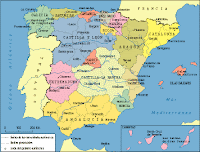The 'growth dinner' of EU leaders is about to start. No big decisions are expected (this is a meeting of EU leaders after all) but here's an overview of where the different big countries are at:
Germany
Berlin remains fiercely opposed to Eurobonds, but interestingly, EU Energy Commissioner Günther Oettinger - a fellow member of German Chancellor Angela Merkel's CDU party -
argues in an interview in today's
Handelsblatt:
"Eurobonds are a matter of timing. I advice all participants not to position themselves inherently against them."
Similarly, Rainer Brüderle, the parliamentary leader of the FDP (Merkel's junior coalition partner) told German radio
Deutschlandfunk that if structural reforms and budgetary discipline were implemented, Germany should not rule out the introduction of Eurobonds “at a later stage".
It won't touch Merkel for now, but an indication that Germany is set for a long, grinding and existential (in the euro sense of the word at least) debate on this issue.
Austria
It looks like Austrian Chancellor Werner Faymann is on a different
wavelength to his Finance Minister Maria Fekter. The latter is opposed to the idea of debt-financed growth
à la Hollande, while Faymann told
Kleine Zeitung in an interview that he "fully supports" Hollande in wanting to discuss Eurobonds at tonight's meeting. However, the Austrian Chancellor
made clear that Eurobonds are "a long-term project that cannot be realised in the next two or three years" while stressing the need to also have strong mechanisms to ensure that budget discipline is "an absolute prerequisite" for the proposal to be implemented.
France
French President François Hollande held a joint press conference with Spanish Prime Minister Mariano Rajoy earlier today. Nothing new came out of it and France's focus at the tonight's summit remains:
- Fiscal stimulus is necessary to achieve deficit and debt reduction;
- Greece must remain in the eurozone, and its partners need to do more to help the country return to growth. However, previous commitments must be respected;
- No taboos on Eurobonds - they must be discussed. Their main purpose is to cut the financing costs of struggling eurozone countries.
We can't help noting how Hollande of late stropped referring to the fiscal treaty as frequently, instead stressing the 'growth pact' for the eurozone.
Spain
In his joint press conference with Hollande, Rajoy simply reaffirmed Spain's priorities for tonight's meeting (and the near future), saying that "financing" of states and banks was "the most urgent" of all the issues:
- Immediate action is needed to keep borrowing costs at sustainable levels for Spain and other peripheral eurozone countries. Rajoy stopped short of mentioning the ECB during the press conference, but a new round of ECB bond purchases is clearly on his wish list
- Eurobonds are not a priority, but could be discussed as part of a broader, long-term debate on deepening European integration;
- He also said that the EU need "certainties" including that "the euro will exist for ever and no country will default [on its debt]." The EU institutions should start sending clear messages on these points. Okay, Rajoy...
Italy
Staying true to his style, Italian Prime Minister Mario Monti has kept awfully quiet, although he has
warned that trying to isolate Merkel tonight would be "impractical and counterproductive" (no kidding). Monti and his cabinet are presumably doing a lot of work behind the scenes, based on a couple of specific proposals (which we mentioned
here and
here).
The Italian government yesterday
adopted plans to unblock between €20bn and €30bn by the end of the year to make overdue payments to private firms that have supplied goods or services to the public administrations. Could this be a sign that Monti's proposal to temporarily exempt overdue payments to businesses from the EU's deficit and debt rules is gaining ground in Berlin? Possibly...
UK
The UK will continue to voice its opposition to a financial transactions tax (the Commission STILL
has not given up on this proposal and will apparently present a massaged impact assessment tonight showing that the negative effect on EU GDP is not bad at all, never mind what it said initially). Cameron will also, rightly, push for various pro single market measures. It will be interesting to see how the UK responds to ideas for 'project bonds' and topping up the European Investment Bank. Cameron will also urge "decisive action" over Greece/the euro and may also provide some (largely irrelevant)
advice on how the Greeks should vote in the forthcoming elections and the Germans should respond to proposals for Eurobonds.
In any case, as always, EU leaders will have a lot to talk about.





















